
Stylus Profiler
Innovation History
The Alpha-Step® 100 is the first product of Tencor Instruments.
The Alpha-Step provides impressive improvements in step height measurement accuracy and repeatability over the existing competitive products. With its attractive pricing, small form factor, and improved functionality, it is soon considered a critical quality control tool in most semiconductor fabrication plants, or fabs.
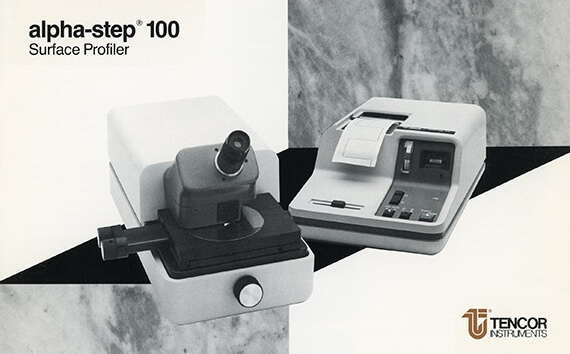
Learn more about our latest offerings in this product series:
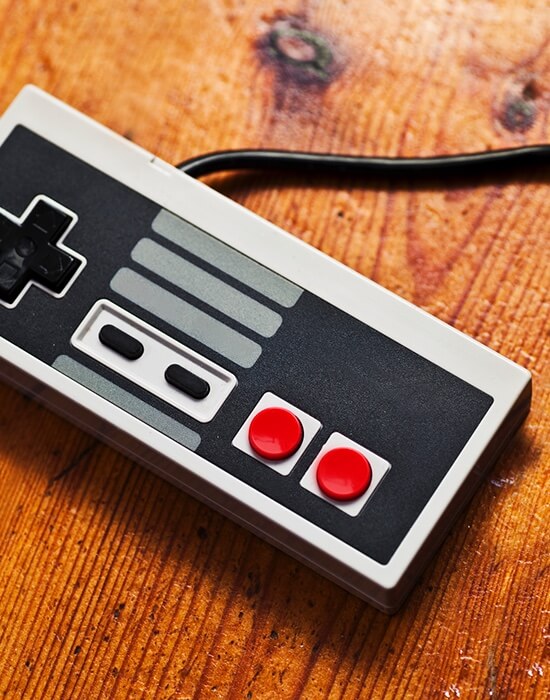
The Alpha-Step 200 tool releases with 2x faster scanning than the competition, a CRT monitor to display the scan profile, plus computer-controlled automated measurement, leveling and calculations.
The new Alpha-Step 250 features an enhanced sensitivity down to 1 Å, using an acoustic enclosure to isolate the measurement from the environment.
The Tencor P-1 Long Scan stylus profiler is the first in the industry to offer ultra-flat 200mm scans in a single profile, without the need to stitch.
The release of the P-1 Long Scan profiler features a revolutionary new design, with industry-first innovations to the scanning stage, optics, and sensor technology-—innovations that provide rock-solid stability, unbeatable sensitivity and repeatability. The system features an ultra-flat scanning stage capable of high-resolution scans up to 200mm in a single scan, enabling characterization of surface roughness, waviness, and thin-film stress. The new stage is also the industry’s first 3D scanning stage, adding a third dimension to characterize surface topography. The system features the first top-view optics to provide a clear view of the sample, free of distortion from the traditional angled side-view. Finally, the sensor technology incorporates the industry’s first and only linear variable differential capacitor (LVDC), resulting in sub-Angstrom electronic resolution with a low moment of inertia, enabling low force control and reducing sensitivity to noise.
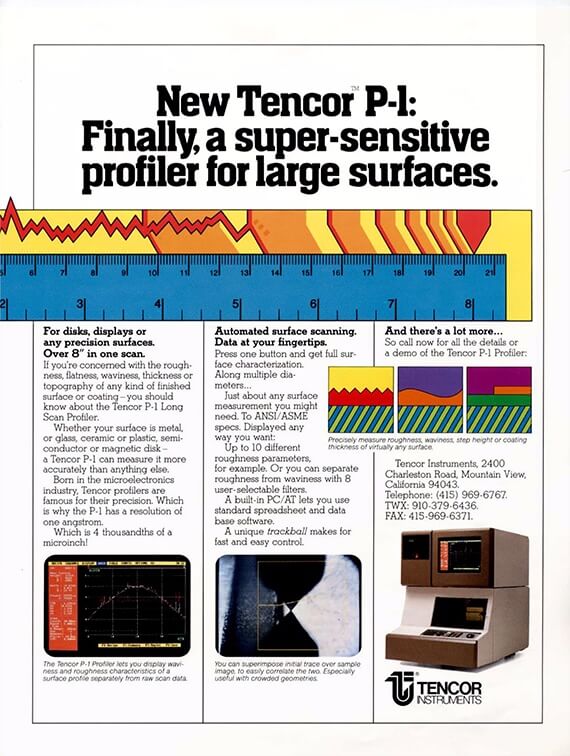
Learn more about our latest offerings in this product series:
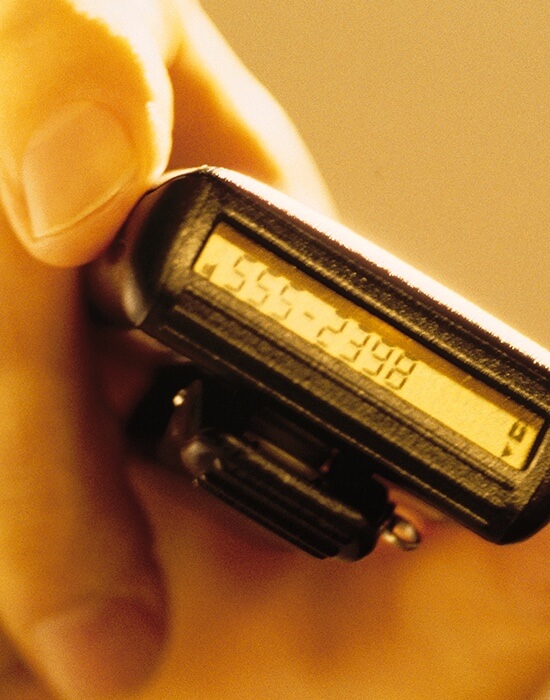
The Tencor P2H is the industry’s first profiler to support an automated wafer and disk handler to minimize defects introduced by the operator touching the samples.
The Tencor P2 open frame offers users the flexibility to load samples up to 430mm by 430mm while the Tencor FP2 provides support for the flat panel industry by enabling scans of samples up to 630mm by 630mm.
The Tencor P-20 is the industry’s first fully automated stylus profiler, from placing the wafer cassette on the tool to final measurement results. To accomplish full automation, the P-20 adds pattern recognition and SECS/GEM in combination with the existing handler.
The Alpha-Step 500 builds on the success of the previous products by adding the capability to measure features up to 1mm in height, plus new high magnification optics and a color camera.
The release of the Tencor P-10, P-11, P-12, and P-22 feature the latest innovations in low force control, the capability for steps up to 1000µm, and enhanced environmental isolation.
The Microhead II enhances the linear variable differential capacitor (LVDC) with the addition of recipe-controlled low force, down to 0.05mg. It adds constant force control by dynamically adjusting the force on the pivot so that the same force is applied on the sample surface regardless of the step height. In addition, a new sensor is available to support step heights up to 1000µm. The P-12 adds new acoustic isolation skins and an active isolation table, enhancing isolation from environmental noise, enabling measurement of the roughness of super-smooth hard drive discs. The P-22 adds an isolation table to the existing P-20 handler-based system for fully automated measurements that include wafer handling capability, pattern recognition, and SECS/GEM, improving production efficiency with a total solution for semiconductor industry.
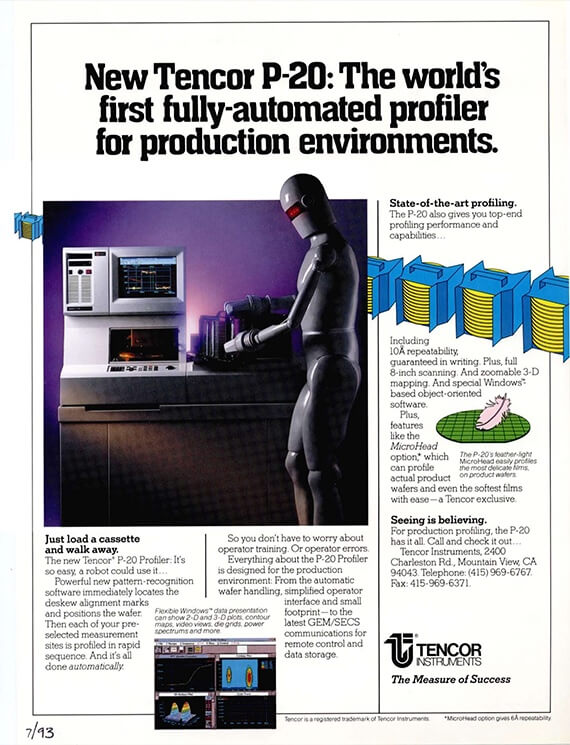
Learn more about our latest offerings in this product series:
The Tencor P-30 replaces the open cassette handler with a SMIF handler and a mini-environment inside the system to support new low particle requirements of the semiconductor industry.
Tencor Instruments and KLA Instruments merge to become KLA-Tencor, Inc., the world leader in yield management and process control solutions for semiconductor manufacturing and related industries.
The HRP®-220 is a breakthrough for inline surface metrology with an industry-first patented dual-stage stylus profiler, combining the long scan stage of the P-22 with a high-resolution piezo stage and the DuraSharp® stylus to enable fine-feature measurement and analysis.
The HRP-320 extends the capability of the HRP-220 to 300mm wafers, with the industry’s first and only system capable of measuring the full diameter of a 300mm wafer in a single scan. This tool also offers a dual stage and the first fully automated measurements using a 200mm/300 mm handler system.
The HRP-240 and HRP-340 represent significant enhancements to the HRP product lines by improving the ease of use, throughput, and precision.
A new piezo flexure stage design is added to minimize out-of-plane motion, improving scan flatness by >2x over the previous design, while maintaining the 90µm by 90µm scan area with 1nm resolution. The system adds inline high and low magnification optics and utilizes the proximity sensor to enable no-touch autofocus, allowing fast, precise focus plus improving stylus lifetime by reducing the number of stylus touches on the surface. The long-scan stage is improved by the addition of linear encoders for more accurate sample positioning, plus higher resolution with a finer pitch leadscrew. Overall system performance is improved by the addition of a digital signal processor to handle all stage controls, reserving the computer processing power for the user interface. Finally, Dipping Mode™ enables measurement of high aspect ratio etch depth features.
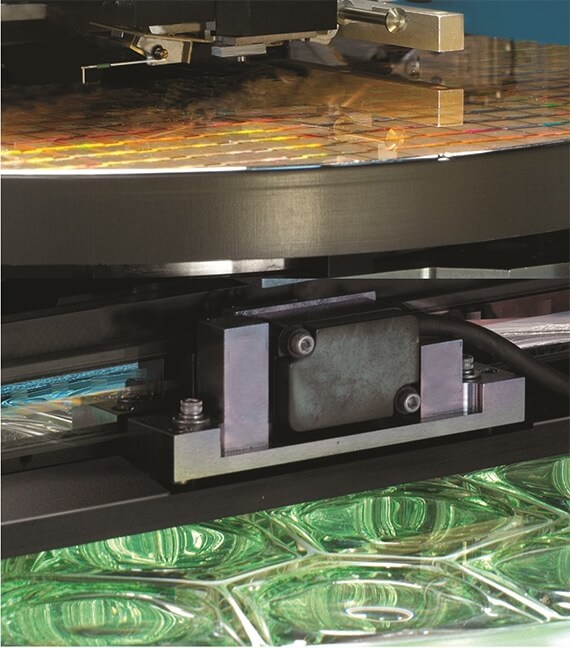
Learn more about our latest offerings in this product series:
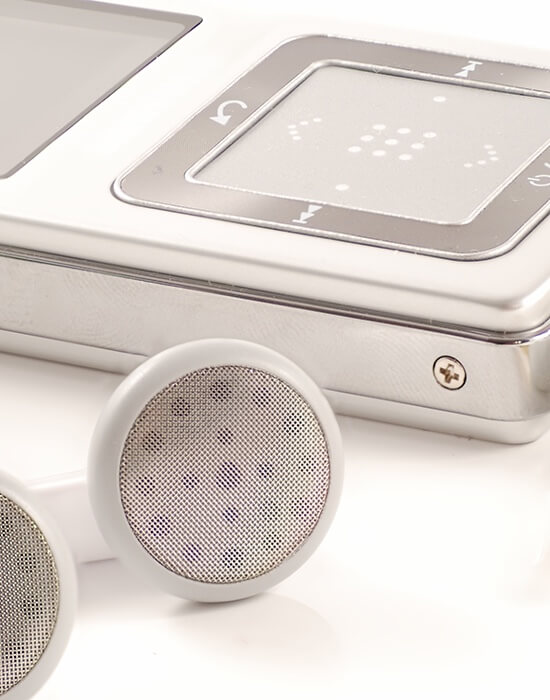
The Tencor P-15 combines the P-10 and P-11 systems to offer a complete surface topography measurement system to support both R&D and production environments on a single platform.
Ambios Technology releases the XP1 and XP2 stylus profilers that feature the industry’s first and only systems with optical lever sensor technology.
The XP1 and XP2 stylus profilers from Ambios Technology introduce an optical lever sensor technology adapted from the Atomic Force Microscope (AFM). The optical lever sensor enables faster scanning while maintaining accurate surface profiling. The novel sensor combined with low force control and support for samples up to 200mm provides customers an affordable surface topography measurement solution.
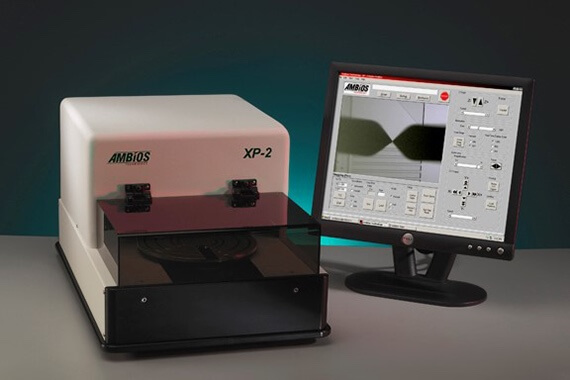
Learn more about our latest offerings in this product series:
The Alpha-Step IQ takes the proven performance of the Alpha-Step 500 and adds new USB electronics and completely redesigned software to significantly improve the ease-of-use and provide enhanced scan sequencing and data analysis capability.
The Tencor P-16+ offers improvements to the industry-leading P-15: new USB electronics, enhanced software, plus Apex advanced data analysis and report writing software.
The Tencor P-6 features the P-16+ LVDC sensor technology and scanning stage technology in a smaller platform, resulting in a high-performance stylus profiler that provides excellent value.
The HRP-250 and HRP-350 tools launch with a lower noise LVDC sensor technology, a new isolation system (HRP-350 only) and a redesigned DuraSharp II stylus. These innovations enable measurement of smaller features and nearly 2x the throughput.
Ambios Technology joins KLA and releases the XP100 and XP200, enhancing the performance of the previous platforms with a new sensor that measures features up to 1200µm tall.

KLA-Tencor releases the Alpha-Step D-100 and D-120 based on the Ambios Technology platform, featuring enhanced optical lever sensor technology with significant improvement in measurement stability.
The new Tencor P-7 and P-17 products feature industry-leading measurement precision, the highest resolution color camera available on a stylus platform, and new performance specifications for long-scan capability critical for bow and stress measurements.
The Alpha-Step D-500 and D-600 tools release with the same high-resolution camera as the P-7 and P-17 platforms. They are the only stylus profilers to feature keystone correction, to remove distortion from the side-view optics, and they provide improvements in the optical lever, scanning stage, and isolating heat sources that result in better measurement repeatability.
The Tencor P-170 combines the performance of the P-17 with the production proven performance of the HRP handler, enabling fully automated measurement capability for the compound semiconductor market.
The P-170 and HRP-260 tools launch with enhanced, production-proven measurement stability and tool matching. The new platforms feature significant improvements in pattern recognition with the addition of geometric pattern recognition, improved accuracy in the deskew algorithm, and new methods for automatic light control. The handler includes new electronics and support for transparent samples such as silicon carbide (SiC) and sapphire, and for opaque samples such as silicon, gallium arsenide (GaAs) and AlTiC. These innovations enable industry-leading, fully automated surface topography measurements with advanced pattern recognition, matching, automated data analysis capability and support for the latest SECS/GEM automation standards.
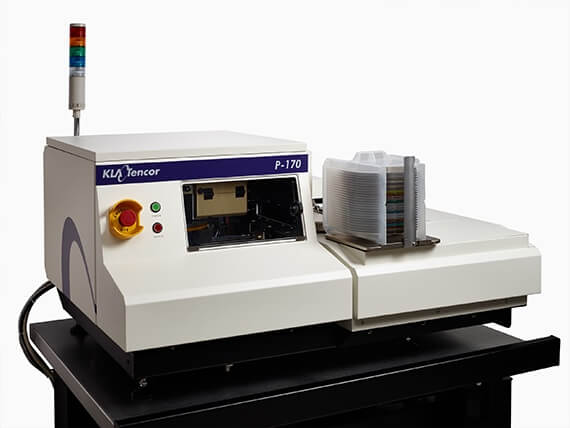
Learn more about our latest offerings in this product series: